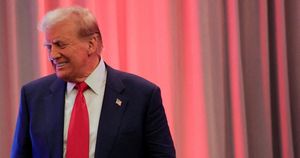San Francisco 49ers defensive end Nick Bosa recently found himself at the center of controversy and conversation after being fined $11,255 by the NFL for wearing a "Make America Great Again" (MAGA) hat during a postgame interview. This incident occurred after the team’s victory against the Dallas Cowboys on October 27, 2024, which had many fans buzzing, both in support of and against Bosa’s bold display.
During the postgame festivities, as Bosa crashed the live interview of his teammates, he donned the white MAGA cap, drawing immediate attention due to its provocative nature. According to sources, the hat bore the slogan made famous by former President Donald Trump’s 2016 campaign. The NFL’s official rules prohibit players from showcasing personal messages or unauthorized branding throughout the game day, particularly during periods when they are visible to the stadium or television audience, which includes postgame interviews.
Bosa’s political alignment has been publicly known, and the decision to wear the hat was viewed by many as more than just casual sports commentary; it was seen as a political statement embedded within the fabric of sports culture. After the game, when asked about his choice, Bosa downplayed the significance of the possible fine, stating, “I haven’t got one yet, but if it does come, it does come. It was well worth it.”
The code of conduct for NFL players stipulates strict guidelines surrounding attire, especially when it involves political messaging. This regulation aims to maintain neutrality and avoid distractions from the sport itself. The concern over allowing political expression versus enforcing uniformity has been increasingly contentious within the league, especially considering the varied political expressions by players over the years.
The timing of Bosa’s fine raised eyebrows among fans and commentators alike. Some speculated whether the NFL was cautious about its decision, deliberately delaying the announcement to sidestep accusations of partisanship, especially with the recent elections fresh on fans' minds. Bosa's hat choice came just days before Trump was declared the winner of the election, weaving the incident deeply within the fabric of the nation's political climate.
Support for Bosa came swiftly from various quarters, including from high-profile figures like Elon Musk, who openly praised the player on social media. Musk’s support echoed across the platforms, indicating how the incident transcended sports and stirred political sentiments. "🔥🇺🇸" Musk tweeted, reflecting the approval from part of the political right for Bosa's display of support during his postgame interview.
This episode has not unfolded without backlash, as NFL fans remain deeply divided. Many applauded Bosa for his acts of defiance against the league's rules, seeing it as a brave assertion of his views. On the other hand, others criticized him for using the platform of professional sports to voice what they referred to as the divisive nature of political rhetoric, arguing it detracted from the unity usually associated with sports.
Since the Black Lives Matter movement gained traction, the NFL has experienced scrutiny for its own policies concerning player expressions. From allowing messages such as “End Racism” and “Stop Hate” on helmets to players proudly carrying the names of victims of civil rights abuses, the league has walked a tightrope between endorsing certain causes and restricting others. Some find the enforcement of these political expressions uneven, feeling the league's history of tolerances and restrictions results in situations like Bosa's. Comparatively, Isaiah Wilson wore shirts supporting President Trump without repercussion, leaving fans questioning the consistency of the league’s disciplinary actions.
Bosa’s actions have sparked dialogue on what the role of athletes should be when it blends with politics. Some argue athletes should remain apolitical to preserve the sanctity of sports, where fans escape everyday realism. Others believe they have the responsibility to voice their beliefs, using their platform to promote political causes or sentiments. With Bosa's hefty fine highlighting this divide within the sporting world, it is clear the conversation surrounding political expression, sports, and public platforms will continue to evolve.
After the events of the postgame interview, Bosa shared his excitement as he intently followed the election coverage and admitted to being thrilled when he saw the results coming for the party he supports. “Clearly, the nation spoke. And we got what we got,” he said, remaining composed even as he faced scrutiny for the hat incident during Wednesday's media session, following the electoral results. Many believe this incident is likely to have longer-reaching effects within the NFL and the broader sports culture, indicating shifts on how political expression is perceived and handled.
Looking forward, Bosa’s case could set precedents within the NFL concerning how it handles player conduct surrounding political sentiments. If players like him continue to assert their voices, it may compel the league to reassess its policies. The scope of this fine reflects not just on Bosa as an individual but opens conversations about the balance between political expression and professional obligations—making this intriguing to fans, commentators, and policymakers alike.



